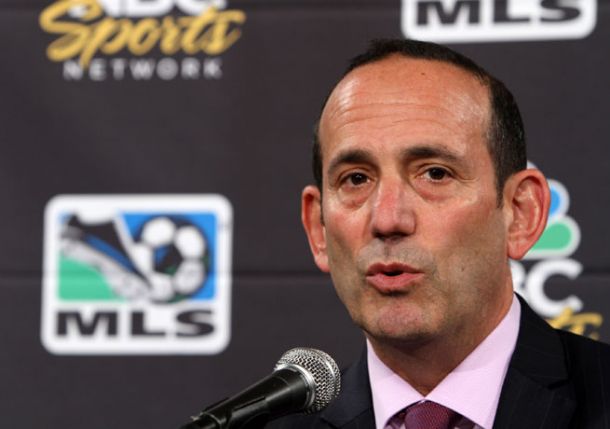As we get closer to the start of the season for the European leagues, many soccer fans in North America who have been looking MLS and the friendlies will be turning their attention eastward.
Many of us have had loyalties with certain European clubs for years. Others can appreciate MLS but want to see more quality in their soccer and see greater entertainment value by looking the top flight teams in the EPL, La Liga, Serie A, and Bundesliga play for glory.
This brings us to a topic that will always be a debate within Major Soccer League. That is whether or not MLS should finally implement the relegation system which is used by the rest of the world, excluding Australia.
This writer remembers being a youngster back in the early 80's and looking teams like the Toronto Blizzard play at the old Exhibition Stadium. The games were fun events, but were not well attended. Yours truly once, being the naive kid he was, walked up to a few players after a match and asked why people were not at the games. Along with the obvious statement of hockey being the primary sport of this country, the players also stated said that the current system is not exciting enough and that America and Canada could never fully embrace the sport. What the players told the wide-eyed youngster had merit as the league folded at the end of the 1984 season.
A condition of hosting the World Cup was for the USA to have it's own soccer league and MLS was born in 1996. Slowly, the game began to catch on with the American public and by the mid 2000's had gained a considerable following. The product kept improving.
In 2007, 2 events occured that would change the entire landscape of North American soccer. David Beckham coming the USA would be far and away the best thing that happened as far as finally achieiving commerical success. Though many of us purists believed Beckham was overrated, and more famous for his looks, his wife, and his timely goals rather then his actual ability, there was no question that Becks entrance had created wide appeal across the country.
The second, (and please forgive this writer has he is a Canadian but just reporting what he saw) was Toronto finally coming back into the majors. For many years Toronto had to make due with the Lynx in the A League and USL. Although the team had a small following, there was just not enough interest or excitement to bring out Toronto's large ethnic and British community who were still always at coffee shops and sports bars early in the morning to look the matches from Europe. When this columnist attended his first soccer game in Toronto after 23 years, he saw an entirely different world at BMO Field from the amateur feel of the Blizzard games. The army of Red Scarves and chants of "This is Our House" were amazing and drew more people into the matches. Many fans from other teams such as DC United and FC Dallas told yours truly that the European-like enthusiasm of the TFC supporters inspired them to get even more into the game.
This now brings us back to the topic of relegation and what it would mean for the MLS.
There are many pros that can be achieved, the first being that teams will be more competitive. The fear of being relegated to the 2nd division, whether it be the USL or NASL, would make clubs more competitive and manangement would be less willing to ride out a bad season and play for the following year.
There is also the schedule which MLS has copied from the NHL of which this author has never liked. Every team should play a home and home with every other club whether it be East or West. When a team gets a new star who is often only in the league for a year, fans in every city deserves to have the opportunity to see the latest DP. Of course injuries could play a part, but that's another story.
With a better quality of play, more fans can be attracted to it. It would be unfair to say it will reach the prestige level of Major League Baseball. But a greater product could be more enjoyable to people who would normally tune into a Real Madrid game. Though many young people do like MLS, a superior product would mean even more kids can dream of starring for the Chicago Fire or New York Red Bulls. And with more support comes a greater TV package that could boost the revenue of MLS and give teams in the 2nd and 3rd division motivation. It could also create even more academies thoughout the continent.
Maybe the strongest point is it can only improve the national product for the US. USMNT Manager Jurgen Klinsmann was quite concerned that many of his players were not getting the experience required to play on the world level. Though the US would have a great World Cup in which they survived the group of death, Klinsmann brought in 11 players who played outside MLS and 4 of them do not even live in the US. Do not get us wrong, as we understand why Klinsmann did this. He felt he needed guys who could play up to the talent in Europe. Thus, working on creating a stronger domestic league should be even more of a priority. One could only speculate on whether this would have made a difference against Belgium who were in a golden generation.
The Canadian product could also improve. Sadly, though there is talent in the Great White North, they are still light years away from being a powerhouse.
The cons of relegation are much more complex.
If relegation went into place, 2 or 3 teams will be relegated and sent to the 2nd division. Though interest has grown considerably throughout MLS, it is hard to speculate on how fans in cities that have lost their Major League status will respond. In England, often, teams that are in the first division and are dropped to the 2nd division completely collapse and within a few years are often in the bottom divisons and in many cases go into recievership. If it can happen in England where soccer is the sport, what could happen in the US and Canada? MLS can risk losing its fan support that it has slowly but surely developed in cities where soccer was never a priority.
The next issue would be what happens when a small club is promoted. Along with the problem of big stadiums being vacant of support, how can an NASL team, which has a stadium of 10,000 people, compete against teams that play with 40,000 fans? True, the promotion would generate some interest but would it be enough to move into a new stadium and generate 15,000 fans in a space of only 4 months? For many new teams it would take a miracle to survive the system and their fall from the first division could be more rapid then Derry County in 2007-08.
Plus, how would the playoffs be impacted? Could MLS continue the playoffs as is or adopt it into an FA Cup type of competition where the lower teams can also compete for the US cup? By tradition, the US has always enjoyed a playoff format, and would changing the competition take away from the thrill of holding a league cup?
With so much competition in the US from other sports, whether it be NFL, MLB, NBA, NCAA or the NHL, would the threat of relegation scare off current and future sponsors of associating themselves with a club that may end up being minor league?
Truly, MLS has reached a point where it's starting to consider it's options going forward. With more expansion looming, MLS may begin to see a dip in the product as teams get more diluted with players who are veterans of the 2nd and 3rd division. Currently the leagues below MLS more or less follow relegation but in many cases demote themselves to the lower divisions or buy their way into MLS. How would changing into a more structured system for all leagues effect soccer in North America?
One thing is for sure. If MLS applies the relegation system, there is no going back, and soccer in the US and Canada will never be the same.










































